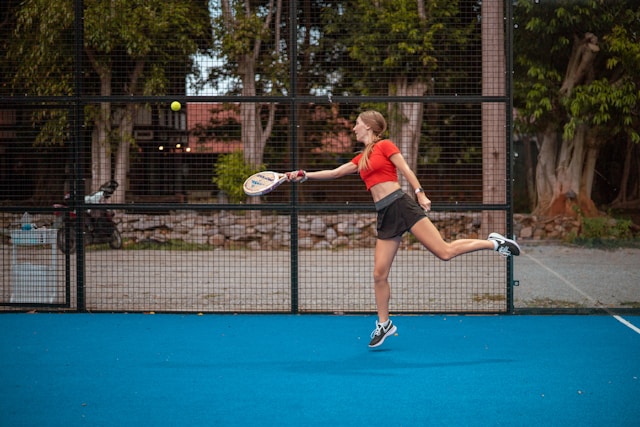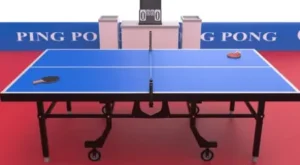Table Tennis Mental Toughness Techniques
Mental continuity is a pivotal aspect of any sport, and table tennis is no exception. As a presto-paced and strategic game, table tennis requires players to remain calm under pressure, make quick opinions, and stay mentally focused throughout the match. In this composition, we’ll explore 15 best Table Tennis Mental Toughness Techniques effective internal continuity ways that will help you meliorate your performance and achieve your pretensions in table tennis. Whether you’re a beginner or a seasoned player, these strategies will help you maintain your countenance and succeed in competitive play.
Visualization for Mental Strength
- Visualization for Mental Strength fantasize yourself executing perfect serves and shots before the game.
- This internal practice helps boost confidence and prepares you for success.
Visualization is a great tool for erecting internal durability in table tennis. Spend a many twinkles imaging yourself in challenging situations and prostrating them. This helps you stay confident and ready for real match scripts. Mentally rehearsing your moves can significantly enhance your game.
Positive Self-Talk
- Positive tone-Talk Replace negative studies with empowering, positive declarations.
- Tell yourself,“ I can handle this,” during tough moments in the game.

Positive tone-talk plays a pivotal part in staying mentally tough during table tennis matches. When effects get tough, rather of getting frustrated, use declarations like “I’ve got this. ” This simple shift in mindset will help keep your focus and boost your performance under pressure.
Stay Present in the Moment
- Stay Present at the moment Focus on each point rather than the overall score to reduce pressure.
- Staying at the moment improves your decision-making during fast rallies.
One of the stylish internal durability ways is staying present during matches. Don’t dwell on once miscalculations or worry about the unborn points. Concentrating on the current point helps you respond effectively and stay calm. Being completely present makes it easier to acclimate to your opponent’s moves.
Breathing Techniques for Calmness
- Breathing ways for Calmness Deep, slow breathing helps control jitters and maintain focus.
- Breathe deeply between points to stay relaxed and composed.
Breathing ways are essential for keeping calm under pressure in table tennis. When you are feeling tense, decelerate down and take a deep breath. This simple action helps regulate your feelings and clears your mind, allowing you to play with lesser clarity and focus.
Manage Pressure Situations
- Manage Pressure Situations Break down tough situations into lower, manageable tasks.
- Focus on one point at a time rather of fussing about the entire match.
Handling pressure effectively is crucial in competitive table tennis. Rather of allowing about the whole game, concentrate on winning the coming point. This strategy keeps you from feeling overwhelmed, and breaking down the game into small corridor helps you manage stress better.
Develop a Pre-Game Routine
- Establish a consistent routine that calms your nerves before matches.
- A structured routine helps build mental consistency and reduces anxiety.
Creating a pregame routine is an important way to mentally prepare for competition. Whether it’s stretching, taking deep breaths, or repeating positive declarations, having a routine gets your mind into a focused state. A dependable routine will help you feel more predicated before you start playing.
Focus on the Technique, Not the Outcome
- Focus on the Process, Not the Outcome Concentrate on playing each shot well rather of fixating on winning.
- Fastening on the process helps you stay relaxed and perform better.

Table Tennis Mental Toughness Techniques Staying process-acquainted is a great way to reduce anxiety and ameliorate performance. When you concentrate too significant on winning, it can make you tense. Rather, pay attention to perfecting your fashion. This helps you stay relaxed and naturally boosts your chances of winning.
Build Mental Endurance
- Train your mind to stay focused even when fatigue sets in.
- Mental endurance keeps you sharp and reduces errors in long matches.
Mental abidance is pivotal for maintaining performance throughout a match. As fatigue sets in, your capability to concentrate can wane. By rehearsing staying engaged during training sessions, you’ll make the internal stamina demanded to perform constantly, indeed in lengthy games.
Learn from Mistakes
- Treat mistakes as learning opportunities rather than sources of frustration.
- Analyze errors calmly and make adjustments during the match.
Every player makes miscalculations, but how you handle them shows your internal durability. Rather of letting frustration take over, stay calm and suppose about what you can ameliorate. Learning from your crimes snappily will help you bounce back and perform better in the coming point.
Handle Distractions with Focus
- Develop strategies to quickly refocus when distractions arise.
- Practice concentrating on your paddle or the ball to regain focus.
Distractions are common during matches, but mentally tough players know how to handle them. If you lose focus, take a moment to zero in on something familiar like your racket or the ball. This simple trick will help you stay locked into the game no matter what’s happening around you.
Emotional Control During Matches
- Keep your emotions in check to maintain clarity and focus.
- Calm feelings lead to smarter decision-making and better performance.
In a fast-paced game like table tennis, feelings can run high. Mentally tough players keep their feelings in check, indeed during violent moments. Stay composed, and avoid letting anger or excitement cloud your judgment. This will help you make more thoughtful and effective plays.
Adaptability: Adjust Your Strategy
- Rigidity Acclimate Your Strategy Stay flexible and acclimate your strategy grounded on your opponent‘s game.
- Rigidity gives you an edge when facing unanticipated challenges.
Being adaptable is a hallmark of internal durability in table tennis. Not every game will go according to plan, but being flexible allows you to make necessary adaptations mid-game. Whether your opponent’s style changes or new challenges arise, staying adaptable will help you maintain control.
Practice Mindfulness in Training
- Focus on the present moment during practice to improve focus in matches.
- Mindfulness helps you stay aware of your body movements and the ball.
Incorporating awareness into your training builds internal durability by stropping your mindfulness. Practice being fully present while you train, paying attention to your breathing and movements. This habit will translate into improved focus and performance during matches.
Stay Confident in Tight Situations
- Remain confident and trust your abilities in high-pressure moments.
- Confidence helps you stay aggressive and make better decisions.

Confidence is crucial, especially in tight situations like match points. Trust in the training and skills you’ve developed, and believe that you can handle the pressure. Confidence allows you to stay proactive and make assertive plays when the stakes are highest.
Use Relaxation Techniques Post-Match
- Engage in relaxation techniques like deep breathing after intense matches.
- Post-match relaxation helps you mentally recover and reflect on your performance.
After a match,
it’s Important to decompress mentally. Use relaxation ways similar as contemplation or deep breathing to calm your mind. This not only helps with internal recovery but also allows you to reflect on the game and learn from it, preparing you better for unborn matches.
Conclusion of Table Tennis Mental Toughness Techniques
learning internal durability ways is crucial to succeeding in table tennis. With strategies like visualization, positive tone-talk, and staying present, you can enhance your performance under pressure. By incorporating these styles into your practice and matches, you’ll come a more focused, confident, and flexible player able of outstripping in competitive table tennis. Do you want to know more About Us?
Do You want to know more About Travel?
Hey Dude! If you want to travel to the other countries and want to know explore the World, Then this site provides you various of Information About Travel. So let’s go there and bright your Future.
Difference Table of the Content
| Technique | Description | Key Points |
|---|---|---|
| Visualization for Mental Strength | Mentally rehearsing your actions to build confidence and readiness for match situations. | – Imagining perfect serves and shots. – Boosts confidence. – Prepares for real match situations. |
| Positive Self-Talk | Replacing negative thoughts with empowering statements during the game to keep a positive mindset. | – Use phrases like “I’ve got this.” – Helps stay calm and focused under pressure. – Boosts performance. |
| Stay Present in the Moment | Focusing on each point rather than worrying about the overall score to stay calm and make better decisions. | – Focus on one point at a time. – Reduces pressure. – Improves decision-making during fast rallies. |
| Breathing Techniques for Calmness | Using deep, slow breathing to manage anxiety and maintain focus throughout the match. | – Slow deep breaths between points. – Helps stay relaxed. – Clears the mind for better focus. |
| Manage Pressure Situations | Breaking down challenging moments into smaller, more manageable tasks to avoid feeling overwhelmed. | – Focus on winning one point at a time. – Reduces anxiety. – Helps manage stress. |
| Develop a Pre-Game Routine | Establishing a calming routine to mentally prepare for a match. | – Structured routine before play. – Reduces anxiety. – Helps get into a focused mindset. |
| Focus on the Technique, Not the Outcome | Concentrating on the process of playing each shot correctly rather than obsessing over the final result. | – Focus on execution, not winning. – Reduces anxiety. – Improves performance through relaxation. |
| Build Mental Endurance | Training your mind to maintain focus even during fatigue. | – Helps stay engaged during long matches. – Improves concentration. – Reduces errors. |
| Learn from Mistakes | Treating mistakes as learning opportunities rather than letting frustration take over. | – Stay calm after errors. – Analyze mistakes to improve. – Helps bounce back quickly in a match. |




